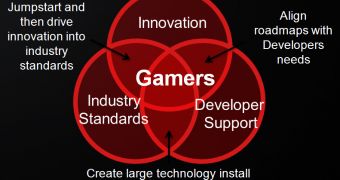Graphics technology is a big part of the entire IT industry, whether it is used in design, visual simulations or professional applications, but the one market segment that drives graphics development the most is that of gaming. Games have always prompted hardware makers to improve their offer for the consumer segment and, thus, technology has now reached a stage where in-game realism is unparalleled and even the laws of physics are, more or less, accurately implemented. Seeing that there would be more to lose from sitting out of the spotlight, AMD has decided to make its first massive step in the gaming field at GDC 2010.
Advanced Micro Devices may be the only current supplier of graphics cards with DirectX 11 capabilities, but when it comes to the gaming industry, NVIDIA is much more prominent. The Santa Clara GPU maker has aggressively marketed its PhysX technology and the TWIMTB, whereas AMD failed to get the same level of attention. Now, NVIDIA is making another serious foray into the 3D front. Granted, AMD has been challenging the legitimacy and worth of NVIDIA's PhysX for a while now, but this hasn't stopped its adoption. As such, the Sunnyvale, California-based CPU and GPU maker has decided to take a more radical step.
At the game Developers Conference, the Tech Report says, AMD made public what is now called the Gamers Manifesto. AMD pledged to align its innovations to the wants and needs of the gaming community, it promised that it would do its best to always meet industry standards and even offered technical and business support for game developers.
“We will consult with the gaming community to help align our innovations to their wants and needs. Wherever feasible we will move quickly to move our innovations into the industry standards. We will provide the technical and business support game developers need to help make their games a success. All gamers, those with AMD hardware in their system, or not, deserve the best gaming experience possible,” the manifesto reads.
Whether AMD succeeds in raising its status in this industry will likely depend on the performance of its Open Physics Initiative.

 14 DAY TRIAL //
14 DAY TRIAL //